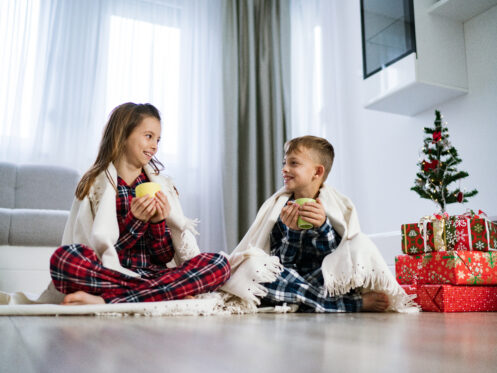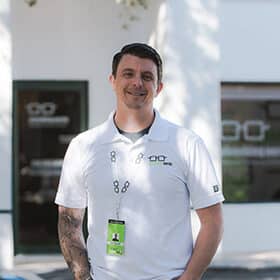Indoor air quality is a major concern, as studies have repeatedly shown that indoor air is almost always more polluted than outdoor air. Indoor air pollution can exacerbate allergy and asthma symptoms and also potentially lead to long-term health issues. Poor indoor air quality can also make your home smell musty and unpleasant. If you’re planning on hosting any parties or get-togethers over the holidays, here are some tips that can help you avoid indoor air quality issues and also keep your home smelling fresh.
Run the Hood or Exhaust Fan in Your Kitchen When Cooking
Cooking is a major source of indoor air pollution and can release many potentially harmful volatile organic compounds (VOCs). If you’re planning on hosting a holiday meal or doing lots of cooking and baking, it’s recommended to turn on the vent hood or exhaust fan in your kitchen. It’s also a good idea to leave the fan running for at least 15 to 20 minutes after you’re done.
The fan will work to pull all of the pollutants and airborne contaminants outside and help to prevent your cooking and baking from contributing to worsening indoor air quality. It will also remove much of the heat and moisture that are produced when cooking and help to keep your home more comfortable.
Avoid Chemical Cleaning Agents When Possible
Chemical cleaning products are also major contributors to indoor air pollution and poor air quality as many of them continually release or “off-gas” various VOCs. If you use lots of different chemical cleaning products when cleaning up before or after your holiday meals, you’ll end up breathing in lots of the chemicals and VOCs. The air in your home may also start smelling acrid or have an unpleasant chemical odor.
This is why experts recommend opting for all-natural cleaning agents whenever possible. White vinegar is also extremely effective for cleaning countertops, mopping floors, etc. and typically works just as well as most chemical cleaning agents.
You should also avoid using any type of chemical drain cleaner when trying to clear a clogged pipe, drain, or toilet. Not only do drain cleaners release lots of harmful chemicals into the air, but they can also cause serious damage to your plumbing system.
Only Use Candles Sparingly
Having lots of flickering candles can make your home seem more festive. The only problem is that having lots of candles burning in your home will quickly lead to the air quality worsening. Candles give off soot into the air, and they also produce many carcinogenic VOCs like formaldehyde, toluene, benzene, etc. Candles give off many of the same toxins that are produced when diesel fuel burns, just not in as high of a concentration.
If you do want to have candles going during the holidays, there are ways to lessen the amount of pollution they produce, such as by making sure to keep the wicks trimmed short and never let a candle burn for more than one hour continuously. Free-standing candles like tapers and votives are also better options than candles in a glass container. The problem with containers is that they can interfere with the airflow and cause the flame to flicker more, which is an issue since flickering flames produce more harmful emissions. This is also why your candles shouldn’t be in a drafty place since this will also cause the flames to flicker more.
Turn the HVAC Blower On to Filter the Air in Your Home
The winters in Southwest Florida are typically warm enough that you don’t need to turn the heat on, but not so hot that you need to run your air conditioning. On days when you don’t need heating or AC, you may consider switching the HVAC blower or fan on so that it runs continuously. When the fan runs constantly, it will keep circulating the air in your home and pulling it through the HVAC air filter.
Although the air filter is mainly designed to keep dust and debris out of your HVAC system, it will also trap some allergens and pollutants from the air. This is especially true if you use a more efficient, higher-quality MERV 10 or MERV 12 filter. Having the fan running will also keep your home more well-ventilated and prevent the air from becoming stale.
You can also obviously open your windows for ventilation. The problem is that many winter days in our area can still be quite muggy, which can lead to your home feeling overly humid and less comfortable if you have your windows open.
Consider Upgrading to a Whole-Home Air Filtration or Purification System
The best way to permanently and effectively improve the air quality in your home is to upgrade your HVAC system with some type of whole-home air filter or whole-home air purification system. Whole-home air filters like media filters and electronic air cleaners are much more effective and provide a higher level of filtration than any standard HVAC air filter you could use.
Media filters are typically designed to replace a traditional HVAC air filter and are installed in the supply duct just before it meets the air handler or furnace. Most media filters are made of compressed, pleated, and densely packed paper-like fibers, which are extremely effective at capturing the majority of household allergens like pollen, dust mites, pet dander, textile fibers, etc. Some media filters can also filter out bacteria, viruses, exhaust fumes, smoke, and some chemicals like those found in hair spray.
However, this type of filter is generally effective against most airborne chemicals and VOCs. How powerful your HVAC blower is also determines how efficient of a media filter you can use. If you try to use too efficient of a filter, it will drastically restrict the airflow in your HVAC system and make your AC much less effective.
Electronic air cleaners are often a better option as they can trap microscopic particles that would normally be able to pass through a media filter or any other type of physical filter. An electronic air cleaner also won’t ever cause issues with restricted airflow since it doesn’t use a physical barrier to trap particles. Instead, it works by ionizing particles as they enter the air cleaner and giving them an electric or static charge. All of the charged particles are then attracted and cling to charged plates inside the air cleaner so that they can no longer circulate through the air.
Whole-home air purification systems are different. These systems don’t filter the air; instead, they sanitize or purify it. Most air purifiers release specially charged oxidizing ions that get circulated in the home by the HVAC system, and these ions attract and stick to airborne and surface pollutants and contaminants. When the ions come into contact with organic particles like microbial growth spores, pollen, or bacteria, they damage the DNA and cell walls so that the particles instantly become harmless. The ions also stick to any other particles and cause them to form larger clumps that either fall out of the air or will get trapped by the air filter when your HVAC system runs.
If you need any type of HVAC service in the Naples, Fort Myers, Bonita Springs, or Cape Coral areas, Plumbing, Cooling & Electrical Nerds is always ready to help. We can help you overcome issues with the indoor air quality in your home or take care of any air conditioning, heating, or plumbing needs you have. For more information on what makes us the top choice for HVAC and plumbing in Southwest Florida, give us a call today.

